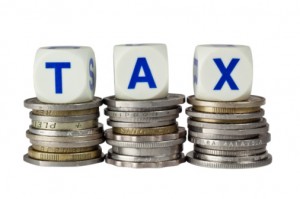A Tax Taxonomy

(Photo: Hemera)
Dan Hamermesh’s much-discussed post about taxing capital gains brought to mind my own taxonomy of taxes, so to speak, from least to most progressive:
- Poll tax. Everyone pays the same amount. What could be fairer than this?!
England tried it in the late 14th century, leading in 1381 to Wat Tyler‘s Rebellion. Six hundred years later, England tried it again, leading to the Poll Tax Riots. - Sales tax. Goods are taxed at a flat rate (often 17 to 20 percent in Europe, and 5 to 8 percent in various American jurisdictions). Because the wealthy spend a smaller fraction of their income on taxable goods than do the poor, this tax is less progressive than a flat income tax.
- Flat income tax. Everyone pays the same fraction of his or her income. This tax was the core of Steve Forbes’s platform when he ran for president in 1996 and 2000.
- Progressive income tax. The usual system today: Higher incomes are taxed at a higher marginal rate. In the U.S., doubts about its constitutionality were settled by the Sixteenth Amendment to the Constitution.
- Flat wealth tax. Wealth (net worth) is taxed at a fixed rate. If income is the flow into net worth, then wealth is its accumulation, so inequalities in income produce significantly larger inequalities in wealth. Thus, a wealth tax is more progressive than an income tax (and a flat wealth tax is probably more progressive than most progressive income taxes).
- Progressive wealth tax. Larger wealth holdings are taxed at a higher rate. Switzerland and France use a progressive wealth tax as part of their tax codes. This link analyzes, with lots of data, the effect of a Swiss-style progressive wealth tax (the data are from the 1980s and 1990s, so all the dollar amounts seem low to us today).
This taxonomy helps me decide how angry to be at various public costs. Even if your sense of justice differs greatly from mine, the taxonomy still can help you decide where to aim your political fire.
Here are examples:
- Social Security taxes. It’s a flat income tax until an annual income of $110,100 (in 2012), with a rate of 12.4 percent (including the employee and employer contributions). Above $110,1000 the marginal rate is zero. Thus, it’s an anti-progressive income tax, falling on the taxonomy between a flat income tax and a poll tax — perhaps like a sales tax.
- Insurance premiums in the American healthcare system. As a zeroth approximation, everyone pays the same amount, with different employers paying different fractions of the total of about $7000 per year per person. There are corrections to this model (individual coverage is extremely expensive, on the one hand; on the other hand, some states offer low-cost plans to residents without employer coverage), but overall it’s a poll tax. When is Wat Tyler’s rebellion coming to the American medical system?
- Tobin tax. It’s a sales tax on financial transactions, so, assuming that financial transactions grow in proportion to wealth, it’s akin to a flat wealth tax.
- Estate taxes in the U.S. The first $5 million is taxed at 0 percent, and amounts above this threshold are taxed at 35 percent (but these provisions change almost yearly). So it’s a progressive wealth tax.
- Subway/bus fares. Fares are roughly the same for almost everyone, although seniors and children often pay less. So the fares are a poll tax or worse (my moral valuations are showing!): The very rich travel by limousine, helicopter, and Lear jet, not by public transport.
- Private college tuition in the United States. It’s an expensive poll tax, mitigated somewhat by financial grant aid (I don’t count loans). However, not all educational institutions use this poll-tax model.
- Waldorf schools in Germany or, at least, the one that friends’ children attend. To cover the portion of the costs not paid by the state, the school charges 11 percent of the family’s after-tax income, no matter how many siblings attend the school. Thus, it is a flat income tax. (See the school’s tuition table [in German].)
Have fun trying the taxonomy on your favorite taxes and charges!
Years ago on a final exam in environmental geography, I proposed that the charge for admission to Yellowstone National Park become a tiny fixed fraction of income (the Waldorf tuition model). I think I proposed 0.02 percent: $8 for a family making $40,000 per year, versus $200 for an high-level executive making $1 million per year. The professor so loathed the idea that he gave the whole exam an F, earning me my only college D. Now, however, I think that my proposal was not quite right. The public already pays for Yellowstone through progressive taxation. Thus, let the cost at the park gate be zero. That would be the only poll tax I support!

Comments